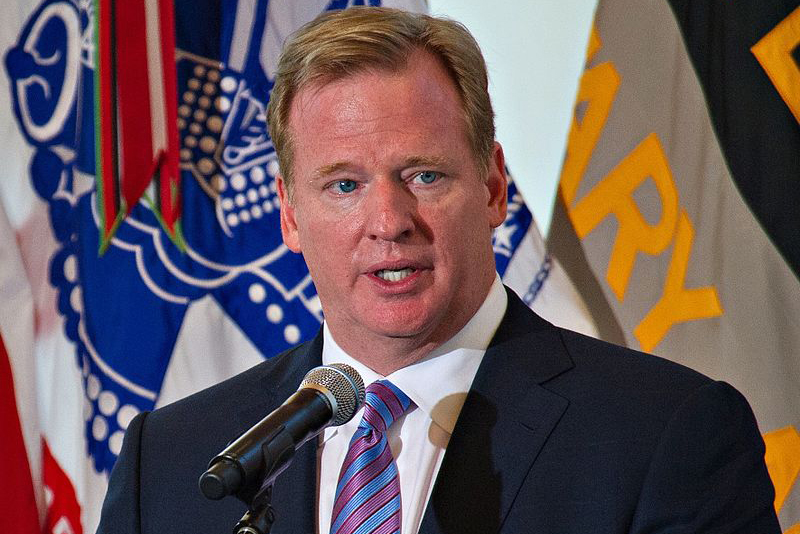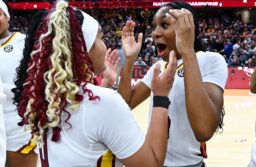
Photo courtesy of SSG Teddy Wade, Wikipedia
Many professional athletes have spoken out about their political views regarding the presidential election, the inauguration and Trump’s executive orders.
However, NFL players consistently tend to shy away from sharing their political opinions with the media.
It is an interesting idea that there is no place for politics in football.
As a corporation and from a business standpoint, the NFL has chosen only to back causes that are impossible to argue with, such as supporting the troops and standing up to cancer.
It is a smart move on their part, as incorporating personal beliefs with business tends to make things a little messy.
While it is certainly important to have an order to things (such as strictly enforcing the uniform policy and fining athletes who choose to break this rule), it is not okay to alienate or shun players who express thoughts that not everyone necessarily agrees with.
Take San Francisco 49ers quarterback Colin Kaepernick, for example. Kaepernick made headlines for his decision to kneel during the National Anthem. His reasoning was to bring attention to the racial profiling and police brutality that minorities face; however, he was met with severe criticism and many felt that his act of protest was “un-American.”
For a league that prides itself on being America’s favorite sport, this would naturally be cause for concern.
Athletes who go against the influential ideals of the game Americans have come to know, love and look forward to watching every Sunday night stand a chance of seriously angering the league and those in charge of it.
In fact, commissioner Roger Goodell released a statement to USA Today about Kaepernick’s actions, stating, “We believe very strongly in patriotism in the NFL. I think it’s important to have respect for our country, for our flag, for the people who make our country better, for law enforcement, and for our military who is out fighting for our ideals.”
Since then, NFL players have kept more of a low profile and have avoided stirring the political pot. They are worried that if they do, drama will ensue and they will be punished with loss of endorsements, fan bases and at an extreme, their jobs.
Just because a player has something controversial to say and is given a larger platform to say it on does not mean he or she should be threatened into silence.
Even more interesting is the fact that while the NFL has tried to distance itself and its players from politics, Super Bowl LI featured a slew of political commercials.
This year, the classic Budweiser commercial gave a nod to the issue of immigration. Google ran a commercial centered around equality, as did Airbnb with the hashtag “#weaccept.” 84 Lumber featured a commercial focused on the border wall controversy, and Audi stressed the importance of equal pay, which came right after the Women’s Marches.
All of these commercials made strong political statements, which strayed from the classic ones with puppies and horses, and the comical ones that typically include babies talking about financial services.
Lady Gaga was also an interesting choice for the halftime show. The singer is famous for hits such as “Born This Way,” in which she stresses individuality and equality “whether you’re gay, straight, or bi, lesbian, transgender life.”
Gaga performed “This Land is Your Land,” which many have thought to be a subtle statement about President Trump’s executive order to begin construction of a Mexican border wall. The little-known fourth verse goes, “There was a big high wall there that tried to stop me. The sign was painted, said ‘Private Property.’ But on the backside, it didn’t say nothing. This land was made for you and me.”
So the question is, if commercials that air during the Super Bowl as well as the artist that performs at the halftime show are allowed to express political opinions, why can’t NFL players?
Technically, they can, but it is a topic that most players are not willing to discuss anymore.
In an interview with USA Today, Ricky Jean Francois of the Washington Redskins was asked if he would be willing to talk about politics with the press, to which he replied, “With the backlash and whiplash that comes from talking about it? Are you nuts? No way.”
He continued, “When it comes to politics, religion and race in America, they say you can talk about them, but you really can’t do that here. When you see an athlete open their mouth about who they’re voting for, or what they think about the presidential election, you might as well be prepared for every person in the United States to go after them. You can’t talk about politics without being judged.”
MMQB.com reported that 11 NFL players declined to answer when asked who they would vote for, and that one NFC team went so far as to impose a strict ban on political talk in the locker room.
Joshua Cribbs of the Cleaveland Browns told NFL.com that most NFL players did not even vote in the election.
When asked about his political views, Tom Brady suggested that the media ask his supermodel wife, Gisele Bündchen, instead.
With the NFL silencing its players, it is hard not to question if this is the reason that ratings have been so low.
Seattle Seahawks’ Richard Sherman told USA Today that the ratings crisis is due in part to the fact that the NFL is not fun anymore because the league “no longer allows the players to show any kind of personality, any kind of uniqueness, any individuality. They want to control the product. They want to control the messaging.”
If the NFL continues to suppress its players’ thoughts and opinions, it will create a distance that viewers will be very much aware of.
In press conferences and interviews, if a player is posed with a question and refuses to comment, or takes the easy route and offers a mundane, safe response, it does avoid controversial conversations; however, it makes players unrelatable.
The rest of the world is dealing with very real issues and having thought-provoking conversations about them, while NFL players are being forced to hide behind their helmets and remain silent.
khueston@ramapo.edu





